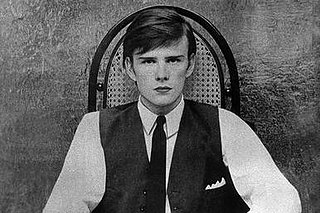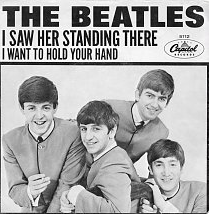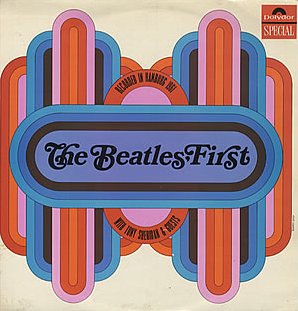
Stuart Fergusson Victor Sutcliffe was a British painter and musician best known as the original bass guitarist of the Beatles. Sutcliffe left the band to pursue his career as a painter, having previously attended the Liverpool College of Art. Sutcliffe and John Lennon are credited with inventing the name "Beetles" (sic), as they both liked Buddy Holly's band, the Crickets. They also had a fascination with group names with double meanings, so Lennon then came up with "The Beatles", from the word beat. As a member of the group when it was a five-piece band, Sutcliffe is one of several who are sometimes referred to as the "Fifth Beatle".

Bert Kaempfert was a German orchestra leader, multi-instrumentalist, music producer, arranger, and composer. He made easy listening and jazz-oriented records and wrote the music for a number of well-known songs, including "Strangers in the Night", “Danke Schoen” and "Moon Over Naples".
"My Bonnie Lies over the Ocean", or simply "My Bonnie", is a traditional Scottish folk song and children’s song that is popular in Western culture. It is listed in Roud Folk Song Index as No. 1422. The song has been recorded by numerous artists since the beginning of the 20th century, and many parody versions also exist.
The Hully Gully is a type of unstructured line dance often considered to have originated in the 1960s, but is also mentioned some forty years earlier as a dance common in the black juke joints in the first part of the twentieth century. In its modern form it consisted of a series of dance steps called out by the MC. Each step was relatively simple and easy to execute; however, the challenge was to keep up with the speed of each step.

Anthony Esmond Sheridan McGinnity, known professionally as Tony Sheridan, was an English rock and roll guitarist who spent much of his adult life in Germany. He was best known as an early collaborator of the Beatles, one of two non-Beatles to receive label performance credit on a record with the group, and the only non-Beatle to appear as lead singer on a Beatles recording which charted as a single.
The Vibrations were an American soul vocal group from Los Angeles, California, active from the mid-1950s to 1976. Most notable among the group's hit singles were "My Girl Sloopy" (1964) and "Love in Them There Hills" (1968). They also had a hit with the up-tempo song “Surprise party for baby” (1971) in the UK on the Northern Soul scene. The quintet's members included Don Bradley, Carl Fisher, Dave Govan, James Johnson and Ricky Owens.

Live! at the Star-Club in Hamburg, Germany; 1962 is a double album featuring live performances by the English rock band the Beatles, recorded in late December 1962 at the Star-Club during their final Hamburg residency. The album was released in 1977 in two different versions, comprising a total of 30 songs by the Beatles.

Daniel Joseph Anthony Meehan was a founder member of the British group the Drifters with Jet Harris, Hank Marvin and Bruce Welch, which evolved into the Shadows. He played drums on early Cliff Richard and the Shadows hits and on early Shadows' instrumentals.
"Mr. Moonlight" is a song written by Roy Lee Johnson and recorded by Dr. Feelgood and the Interns in 1962. The song was covered by the Beatles on their 1964 albums Beatles for Sale and Beatles '65.

"I Saw Her Standing There" is a song by the English rock band the Beatles, written by Paul McCartney and John Lennon. It is the opening track on the band's 1963 debut UK album Please Please Me and their debut US album Introducing... The Beatles.
The Olympics are an American doo-wop group, formed in 1957 by lead singer Walter Ward. The group also included Eddie Lewis, Charles Fizer (tenor), Walter Hammond (baritone), and Melvin King (bass). With the exception of Lewis, all were friends in a Los Angeles, California, high school.

Ain't She Sweet was an American compilation album featuring four tracks recorded in Hamburg by The Beatles in 1961 and 1962. Cover versions of Beatles and British Invasion-era songs recorded by the Swallows complete the tracklist.

"Kansas City" is a rhythm and blues song written by Jerry Leiber and Mike Stoller in 1952. First recorded by Little Willie Littlefield the same year, as "K. C. Loving", the song later became a chart-topping hit when it was recorded by Wilbert Harrison in 1959. "Kansas City" is one of Leiber and Stoller's "most recorded tunes, with more than three hundred versions", with several appearing in the R&B and pop record charts.

The Beatles' First! is a German compilation album of songs recorded in Hamburg in 1961 and 1962 by Tony Sheridan with the Beatles as his backing group. It was originally released in 1964 in Germany, then issued in 1967 in England, 1969 in Canada and finally in the United States in 1970.

"Ain't She Sweet" is a song composed by Milton Ager, with lyrics by Jack Yellen. It was published in 1927 by Ager, Yellen & Bornstein, Inc. It became popular in the first half of the 20th century and typified the Roaring Twenties. Like "Happy Days Are Here Again" (1929), it became a Tin Pan Alley standard. Both Ager and Yellen were elected to the Songwriters Hall of Fame.
Little Caesar & the Romans were an American musical group from Los Angeles, California, United States, active briefly in the 1960s.
Cliff Bennett and the Rebel Rousers were a 1960s British rhythm and blues, soul and beat group who had two top 10 hits with "One Way Love" and "Got to Get You into My Life".
Kingsize Taylor and the Dominoes were a British rock and roll band, formed in Liverpool in the late 1950s by Ted "Kingsize" Taylor. One of the first beat groups in the Merseyside area, they were a locally popular and influential group who were contemporaries and rivals of The Beatles, and featured Cilla Black as a guest singer before her solo career, but had little commercial success except in West Germany.
Howard William Casey is a British rhythm and blues and rock saxophonist. He came to prominence in the early 1960s as a member of Derry and the Seniors, the first rock and roll band from Liverpool to play clubs in Germany, and later as leader of the renamed Howie Casey and the Seniors, the first Liverpool group to record an LP. He was a sought after session musician, particularly in horn sections in the 1970s, recording and/or touring with groups including Paul McCartney and Wings, T. Rex, The Who, ABC and The Roy Young Band.
Fred Sledge Smith, often credited as Fred Smith, was an American R&B songwriter and record producer, who worked in particular with The Olympics, Bob & Earl, Bill Cosby, and the Watts 103rd Street Rhythm Band.









